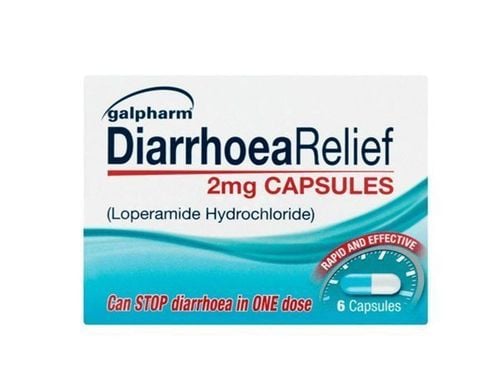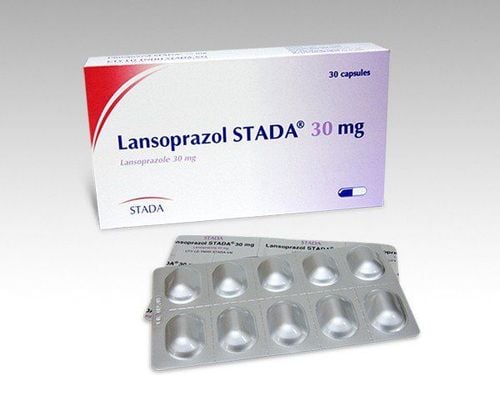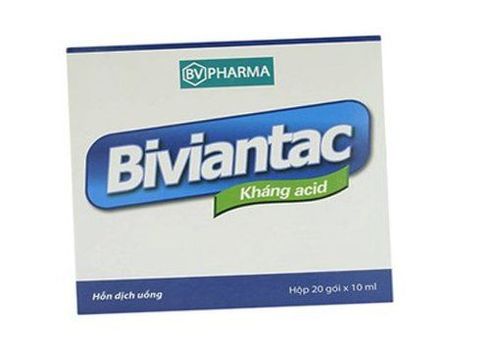This is an automatically translated article.
Asgizole 20mg is a proton pump inhibitor, used in the treatment of gastroesophageal reflux disease, peptic ulcer disease, Zollinger - Ellison syndrome.
1. What is Asgizole?
Asgizole 20mg is a proton pump inhibitor, whose main active ingredient is Esomeprazole. Asgizole is available in the form of a film-coated tablet with a strength of 20mg. Esomeprazole is the S isomer of Omeprazole , used in the treatment of peptic ulcer disease , gastroesophageal reflux disease and Zollinger - Ellison syndrome . Esomeprazole binds to the proton pump H+ /K+ -ATPase in the parietal cells of the stomach, inactivating this enzyme system, preventing the final step of hydrochloric acid secretion into the gastric lumen. Esomeprazole inhibits gastric acid secretion both basal and stimulated. Esomeprazole is a strong, long-acting drug.
2. What is the use of Asgizole?
2.1 Indications of the drug Asgizole Asgizole is indicated in the following cases:
Stomach - duodenal ulcer. Prophylaxis and treatment of peptic ulcers caused by the use of non-steroidal anti-inflammatory drugs. Prevention and treatment of peptic ulcers caused by stress. Maintenance therapy after intravenous prophylaxis of peptic ulcer rebleeding. Gastroesophageal reflux disease (GERD): inflammation of the esophagus caused by reflux with or without abrasion; prevention of recurrence of cured esophagitis; Symptomatic treatment of gastroesophageal reflux disease. Zollinger-Ellison syndrome. Used in combination in the treatment regimen of peptic ulcers caused by Helicobacter pylori and prevention of recurrence of peptic ulcers caused by Helicobacter pylori infection. 2.2 Contraindications of Asgizole Contraindications of Asgizole drug are contraindicated in people who are allergic or hypersensitive to Esomeprazole, Benzimidazole subclass, other proton pump inhibitors or any of the ingredients of Asgizole 20mg.
3. How to take Asgizole
Asgizole 20mg orally. The patient should swallow the tablet whole, do not crush or chew the medicine. Take Asgizole at least one hour before meals.
Gastroesophageal reflux disease (GERD) with esophageal abrasion: 40mg orally per day for 4 weeks. An additional 4 weeks of treatment is recommended for patients with esophagitis that has not healed or has persistent symptoms. Reflux esophagitis without scratching: 20 mg orally per day, duration of treatment for 4-8 weeks. Maintenance treatment after esophagitis has healed or symptomatic treatment in reflux esophagitis: 20mg orally per day. Duodenal ulcer: 20 mg orally per day, duration of treatment for 2-4 weeks. Stomach ulcers caused by taking non-steroidal anti-inflammatory drugs or preventing stress ulcers: 20 mg per day for 4-8 weeks. Prophylaxis of gastric and duodenal ulcer recurrence: 20-40mg per day. Zollinger-Ellison syndrome 60mg daily. The dose of the drug is adjusted according to the individual patient and the degree of increased gastric acid secretion. Asgizole 20mg Overdose and Management
Currently, there are no reports of overdose with Esomeprazole in humans. Management of Asgizole 20mg overdose mainly consists of symptomatic and supportive treatment. Hemodialysis has no effect on increasing the elimination of Esomeprazole, because the drug is highly protein bound. Esomeprazole so far has no specific antidote.
4. Some notes when using Asgizole 20ng
Before using Asgizole proton pump inhibitor, it is necessary to exclude the possibility that the patient has gastric cancer because the drug can mask the symptoms of the disease, delay the diagnosis and treatment of cancer. Prolonged use of Esomeprazole may cause atrophic gastritis or increase the risk of bacterial infections, increase the risk of diarrhea due to Clostridium difficile. Patients with renal impairment: There is no need to reduce the dose of Asgizole 20mg, but it should be used with caution due to limited experience in patients with severe renal impairment. Hepatic impairment: No dose reduction of Asgizole is required in patients with mild and moderate hepatic impairment. Pregnancy: There are currently not enough studies on the safety of using Esomeprazole in pregnant women. Only use Esomeprazole in this subject when absolutely necessary and closely monitor the use of the drug. Lactation: It is not known whether Esomeprazole is excreted in human milk, however another proton pump inhibitor, Omeprazole, does pass into breast milk. Esomeprazole may cause side effects in nursing infants. A decision should be made between discontinuation of breast-feeding or discontinuation of Asgizole 20 mg in lactating women, depending on the importance of the drug to the mother.
5. Undesirable effects when using Asgizole
Some unwanted effects may be encountered when using Asgizole 20mg:
Whole body: headache, dizziness, skin rash. Less common: fatigue, sleep disturbance, pruritus, paresthesia. Fever, diaphoresis, peripheral edema, photosensitivity, alopecia, hypersensitivity reactions. Gastrointestinal: nausea, vomiting, flatulence, dry mouth, abdominal pain, diarrhea, constipation. Esomeprazole reduces the acidity of the stomach, increasing the risk of bacterial infections in the gastrointestinal tract. Central nervous system: agitation, confusion, hallucinations, depression. Respiratory: respiratory infections. Hematology: pancytopenia, leukopenia, leukocytosis may be seen, thrombocytopenia. Metabolism: hypomagnesemia and hyponatremia, porphyria. Musculoskeletal: musculoskeletal pain, osteoporosis, fracture. When unwanted effects become more serious, it is necessary to stop using Asgizole 20mg and go to a medical facility for timely treatment.
6. Drug interactions
Esomeprazole inhibits gastric acid secretion, so the drug increases the pH in the stomach, affecting the bioavailability of pH-dependent absorbed drugs: Ketoconazole, Digoxin, iron salts. Concomitant administration of Esomeprazole with inducers of CYP2C19 and CYP3A4 such as rifampin may decrease Esomeprazole concentrations. Thiazide diuretics or loop diuretics: increased risk of hypomagnesemia when used concurrently with Esomeprazole. Atazanavir: alters the absorption of oral Atazanavir, reduces plasma concentrations of this drug, reduces the antiviral effect. Clopidogrel: Esomeprazole reduces the plasma concentration of the active metabolite of Clopidogrel, reducing the antiplatelet effect of the drug. Digoxin: Prolonged use of Esomeprazole can cause hypomagnesemia, increase myocardial sensitivity to Digoxin, increase the risk of digoxin cardiotoxicity. Sucralfate: inhibits absorption and reduces bioavailability of Esomeprazole. Esomeprazole should be taken at least 30 minutes before taking Sucralfate. Warfarin: Increases INR and prothrombin time when warfarin is used concurrently with a proton pump inhibitor, causing abnormal bleeding and death. When Esomeprazole and Warfarin are co-administered, INR and prothrombin time should be monitored. Clarithromycin: Concomitant administration of esomeprazole increases blood levels of both esomeprazole and 14-hydroxyclarithromycin. Diazepam: Esomeprazole reduces the metabolism of Diazepam, increasing the plasma concentration of Diazepam. Asgizole 20mg is a proton pump inhibitor, used in the treatment of gastroesophageal reflux disease, peptic ulcer disease, Zollinger-Ellison syndrome. To ensure the effectiveness of treatment and avoid side effects, users need to strictly follow the instructions of the doctor, professional pharmacist.
Follow Vinmec International General Hospital website to get more health, nutrition and beauty information to protect the health of yourself and your loved ones in your family.
Please dial HOTLINE for more information or register for an appointment HERE. Download MyVinmec app to make appointments faster and to manage your bookings easily.













